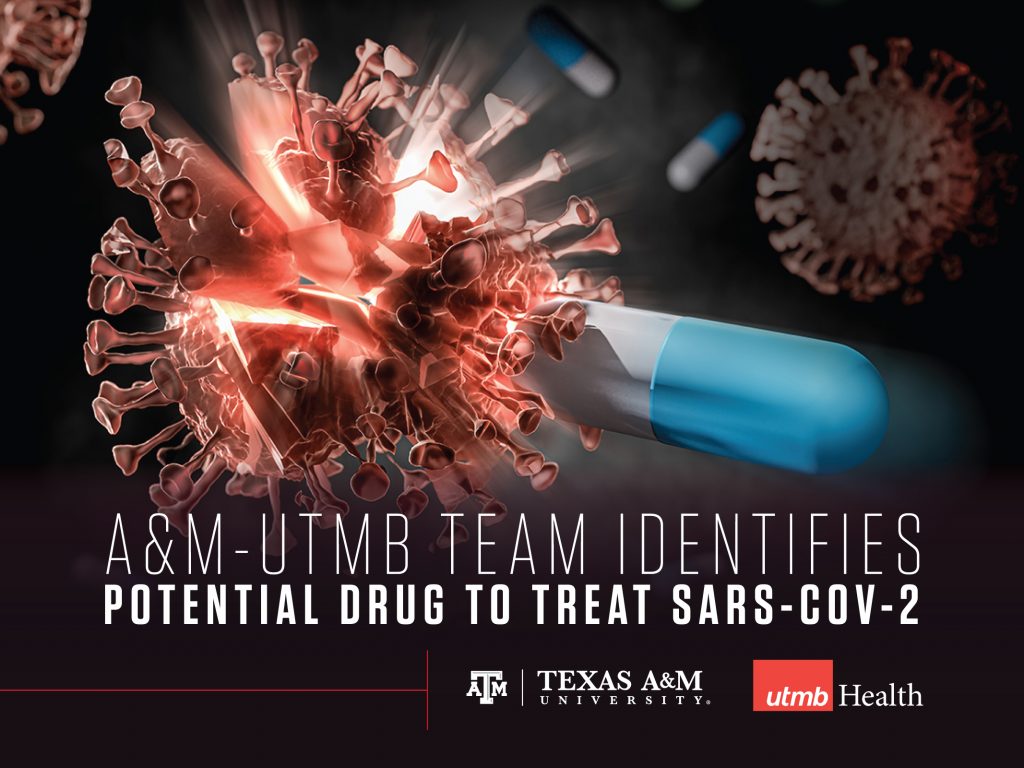A&M-UTMB team identifies potential drug to treat SARS-CoV-2

A federally approved heart medication shows significant effectiveness interfering with SARS-CoV-2 entry into the human cell host, according to a new study by a research team from Texas A&M University and The University of Texas Medical Branch (UTMB).
The medication bepridil, which goes by the trade name Vascor, is currently approved by the U.S. Food and Drug Administration (FDA) to treat angina, a heart condition.
The team’s leaders are Wenshe Ray Liu, professor and holder of the Gradipore Chair, Department of Chemistry, College of Science, Texas A&M, and Chien-Te Kent Tseng, professor and director of the SARS/MERS/COVID-19 Laboratory, UTMB. Liu also holds joint faculty positions in Texas A&M’s colleges of medicine and agriculture and life sciences.
“Only one FDA approved medication is currently available, Remdesivir, to provide limited benefits to COVID-19 patients, and the virus may easily evade it,” said Liu. “Finding alternative medicines is imperative.
“Our team screened more than 30 FDA/European Medicines Agency approved drugs for their ability to inhibit SARS-COV-2’s entry into human cells,” according to Liu. “The study found bepridil to offer the most potential for treatment of COVID-19. As a result, we are advocating for the serious consideration of using bepridil in clinical tests related to SARS-CoV-2.”
The Texas A&M-UTMB study is now available at the website of the peer-reviewed Proceedings of the National Academy of Sciences of the United States of America (PNAS) and is scheduled for print publication on March 9.
The team, which includes six other researchers from Texas A&M and four from UTMB, now plans to advance their work to animal models with a potential for clinical trials.
In addition to Liu, the team includes Shiqing Xu, research associate professor; Kai S. Yang, postdoctoral research associate; and graduate students Erol C. Vatansever, Kaci C. Kratch and Chia-Chuan Cho, all from the Department of Chemistry, College of Science; and Drake M. Mellott, graduate student, Department of Biochemistry and Biophysics, College of Agriculture and Life Sciences, all from Texas A&M; and UTMB colleagues Aleksandra K. Drelich, Kempaiah Rayavara Kempaiah, Jason C. Hsu and Chien-Te K. Tseng.
The project received seed funding in 2020 from Texas A&M’s X-Grants program, an initiative of the 10-year, $100 million President’s Excellence Fund and the Texas A&M Translational Investment Fund.
About Research at Texas A&M University: As one of the world’s leading research institutions, Texas A&M is at the forefront in making significant contributions to scholarship and discovery, including in science and technology. Research conducted at Texas A&M generated annual expenditures of more than $1.131 billion in fiscal year 2020. Texas A&M ranked in the top 25 of the most recent National Science Foundation Higher Education Research and Development survey based on expenditures of more than $952 million in fiscal year 2019. Texas A&M’s research creates new knowledge that provides basic, fundamental, and applied contributions resulting, in many cases, in economic benefits to the state, nation, and world. research.tamu.edu
###
Media contact: Wenshe Liu, wsliu2007@tamu.edu

